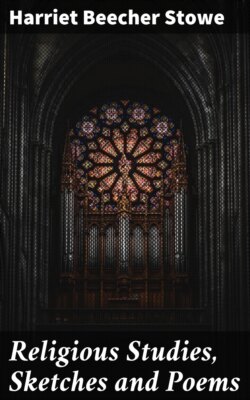Читать книгу Religious Studies, Sketches and Poems - Harriet Beecher Stowe - Страница 8
На сайте Литреса книга снята с продажи.
CHRIST IN PROPHECY
ОглавлениеIn the Old Testament Scriptures we have from the beginning of the world an advent dawn—a rose sky of Promise. He is coming, is the mysterious voice that sounds everywhere, in history, in prophecy, in symbol, type, and shadow. It spreads through all races of men; it becomes an earnest aspiration, a sigh, a moan of struggling humanity, crying out for its Unknown God.
In the Garden of Eden came the first oracle, which declared that the Seed of the woman should bruise the serpent's head. This was an intimation, vague yet distinct, that there should come a Deliverer who should break the power of evil. From that hour every mother had hope, and child-bearing was invested with dignity and blessing. When the mother of all brought the first son into the world, she fondly hoped that she had brought forth the Deliverer, and said, "I have gotten the MAN Jehovah."
Poor mother! destined to a bitter anguish of disappointment! Thousands of years were to pass away before the second Eve should bring forth the MAN Jehovah.
In this earliest period we find in the history of Job the anguish, the perplexities, the despair of the helpless human creature, crushed and bleeding beneath the power of an unknown, mighty Being, whose ways seem cruel and inexplicable, but with whom he feels that expostulation is impossible:—
"Lo, he goeth by me and I see him not; he passeth on also and I perceive him not. Behold, he taketh away, and who can hinder him? who will say unto him, What doest thou? If God will not withdraw his anger, the proud helpers do stoop under him. How then shall I answer him and choose out words to reason with him?"
Job admits that he desires to reason with God to ask some account of his ways. He says:—
"My soul is weary of my life. I will speak in the bitterness of my soul. I will say unto God, Do not condemn me; show me why thou contendest with me. Is it good that thou shouldest oppress, that thou shouldest despise the work of thy hands?"
He then goes through with all the perplexing mysteries of life. He sees the wicked prosperous and successful, and he that had always been devoted to God reduced to the extreme of human misery; he wrestles with the problem; he longs to ask an explanation; but it all comes to one mournful conclusion:—
"He is not a man as I am, that I should answer him, and we should come together in judgment. Neither is there any daysman [arbiter] between us, that might lay his hand on both of us. Let him take his rod away and let not his fear terrify me. Then would I speak; but it is not so with me."
Here we have in a word the deepest want of humanity: a daysman between the infinite God and finite man; a Mediator who should lay his hand on both of them! And then, in the midst of these yearnings and complainings, the Spirit of God, the Heavenly Comforter, bearing witness with Job's spirit, breaks forth in the prophetic song:—
